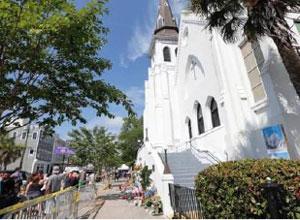
Like millions of other sad Americans, I cannot keep my mind away from the horrible event at the Bible study class in Charleston, known
as the “holy city,” a reference, in part, to its many churches.
Our national distress and revulsion are clear.
The mass murder of innocents has struck a chord in us unlike its grisly predecessors. Among the millions thinking about this violent attack are thousands also writing about it — in various publications and online with almost universal and righteous condemnation. Millions of words have spilled forth and will continue to do so, addressing the innocence of the victims, the youth and life inexperience of the presumed shooter and the proliferation of guns and gun violence in our culture unlike, as President Obama so rightly pointed out, any other developed nation. Given much note, as well, is the tearful forgiveness bestowed in court on the young man in custody by victims’ families. How, we ask ourselves, could the families be so generous only hours after losing loved ones to senseless and inexplicable violence?
None of us understand why our country continues to experience targeted and gross violence aimed at strangers with whom the shooters have no connection and, thus, cannot target individually. I do not pretend to understand any of it, but certain aspects stand out to me.
Young men, guns and the Internet do not mix well.
Developmental researchers tell us that the human brain, especially in men, is not mature until the person is in his or her mid-20s. Think of incidents since the massacre at Columbine High School in 1999, including the mass murders by gunfire at a Sikh temple in Wisconsin, a Colorado movie theater, a first-grade classroom in Sandy Hook, Connecticut, at the Boston Marathon, and, earlier this year, in Chapel Hill.
Except for the Chapel Hill shooting, the killers were young men in their teens or early 20s, angry and isolated if not actually deranged.
We must ask ourselves how and why our society is producing, even nurturing, young men who kill indiscriminately in movie houses and on city streets and sometimes with distinct targets as in Wisconsin
and Charleston.
Why and how does our culture grow such young men and provide them the easy means to commit mass-murder? Mass-murders atrocities will not diminish until we acknowledge and find answers to our questions.
Part of the answers — in my mind, at least — is figuring out how we, the American people, have come to think of people not like ourselves as “the other.”
My photograph appears at the bottom of this page and reveals me the way I think of myself, as a late middle-aged white woman. You may not know anything else about me, but chances are that readers will make assumptions about me and my life based on that photo, and for some, I will be “the other.” Part of this is human nature, but we in America at this point in our history seem to have taken “otherness” to new heights. People who are not like us are “them.”
People of another color than our own are “others.” So are people of different religious beliefs and traditions, so are people who dress differently, whose path to our nation was unlike our own and people of different economic situations.
People somewhere along the sexual spectrum different than our place are routinely ridiculed.
Public school supporters may be suspicious of private school supporters and vice versa.
People who cannot live without guns think the gunless are nuts and vice versa. Ditto for only English speakers and those who speak one or more other languages.
Ditto for Fox News and MSNBC fans, for Democrats and Republicans, for documentary and reality show watchers for University of North Carolina-Chapel Hill and North Carolina
State fans.
You, of course, can think of many more “thems” and “others” and may even have some of your own. Our lists of “others” and “thems” now seem endless, and we are dividing and damaging our own nation and our own culture. We are separating ourselves from each other, and in this divisive process, we are spawning mass murderers.
No one, least of all I, has an answer to how we slipped away from Francis Bellamy’s unifying words embodied in our pledge of allegiance to our flag, “…one nation under God, indivisible with liberty and justice for all.”
As we prepare to celebrate the 4th of July, I hope I live long enough to see the civility and respect implicit in that concept return to
our nation.

 How to resolve AdBlock issue?
How to resolve AdBlock issue? 








